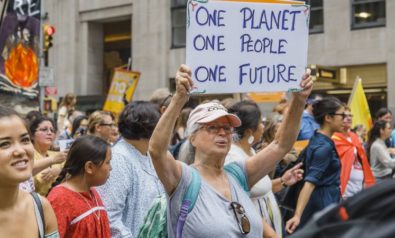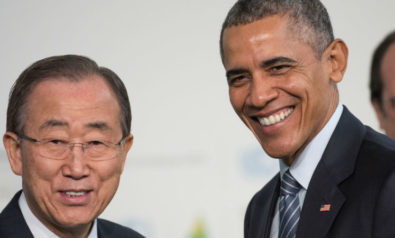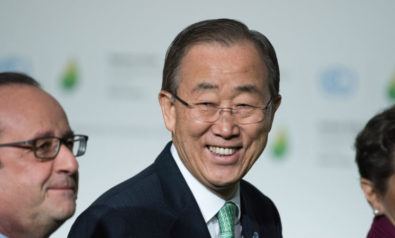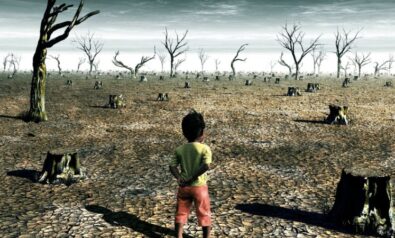What could the rest of the world do if Donald Trump pulls the US out of the Paris Agreement on climate change?
Climate change negotiators from around the world—who recently met at the 22nd session of the Conference of the Parties (COP22) in Marrakech, Morocco—are tasked with putting meaning and action into the landmark 2015 Paris Agreement to bring down global greenhouse gas emissions.
Yet the tone in Marrakech suddenly became subdued as COP22 kicked off. While many conversations remained staunchly defiant, others assumed a funeral-like quality, as national delegates and civil society representatives tried to assess the ramifications of the US presidential election.
Elections can have consequences for global climate change negotiations and the future of the planet.
US President-Elect Donald Trump has repeatedly stated that he does not believe in human-induced climate change. He has argued that climate change is an expensive hoax that was created by the Chinese to make US manufacturing noncompetitive. He has also declared his intent to roll back federal climate change and renewable energy policy. Most importantly, he has loudly declared an intention to “cancel the Paris climate agreement.” (He has since stated in an interview with The New York Times that he has an “open mind” about the accord.)
Some cling to the hope that President Trump will forget pronouncements made by Candidate Trump just as Candidate Trump had ignored the pontifications of Citizen Trump. An important indicator of why this may not be the case is the appointment of Myron Ebell as head of the transition team for the US Environmental Protection Agency (EPA). Ebell, also a frontrunner to be appointed as head of the EPA, is an outspoken climate change denier who flat out rejects the Paris Agreement as unconstitutional.
Notwithstanding the mechanics of officially “leaving” the Paris Agreement—which stipulate a four-year process—how should the rest of the world respond if the Trump administration were to formally or informally disengage from the Paris Agreement?
These authors think there are at least four ways in which things can unfold.
Scenario 1: Walk Out With the US
If the Trump administration decides to withdraw from the Paris Agreement, then other major economies that are parties to the United Nations Framework Convention on Climate Change (UNFCCC) will have justification to do the same. This is de facto what happened with the 1997 Kyoto Protocol once it became clear that the US would not ratify and was not serious about its implementation.
Not least because the Paris Agreement came together as a result of much diplomatic leadership by the Obama administration, other countries would feel a legitimate sense of anger and disappointment toward the United States if it were to walk away from the agreement.
Whether the walkout is a formal withdrawal from the agreement or an informal abdication from its responsibilities, the Paris Agreement would be effectively doomed as signatories fail to meet pledges to reduce country emissions made in Paris. The implication of such a scenario is that the UNFCCC negotiation process could just wither away, and critical agreed-upon temperature goals would slip further out of reach.
Scenario 2: Kick the US Out
As the world’s largest economy, although not by the margins it once was, and the world’s largest emitter of CO2, the US remains central to the enterprise of curtailing global climate change, but arguably is no longer as indispensable as it once was.
Such a rationale and the anger that would be triggered by a US walk-out of the Paris Agreement, particularly amongst the European Union (EU) and China, could induce the parties that remain serious about the agreement to adopt a retaliatory posture. While it would be unprecedented, countries could decide that a US withdrawal from the Paris Agreement should have real consequences for US involvement and participation in the United Nations (UN) climate change process.
If they were to do so, they would be taking a cue straight out of Trump’s book, The Art of the Deal, and its key dictums of “fighting back very hard” and “using every leverage.” As Trump puts it in his book: “The worst thing you can possibly do [is to] seem desperate … That makes the other guy smell blood, and then you’re dead.”
There has already been at least one suggestion that a US withdrawal from the Paris Agreement should be met with not just forcing the US out of all global climate arrangements, but imposing “economic sanctions in the face of this [Trump’s] treaty-shredding lawlessness.”
Scenario 3: Wait it Out
Even if a Trump administration is compelled to take early and visible action on the Paris Agreement to appease its political base, such action could be temporary—either because the reality of governance will eventually trump the necessity of politicking, or because the next election in four years could unseat the Trump administration.
Reasoning along such lines could compel the other countries to simply wait out any tantrums of the Trump administration. Essentially, this would mean ignoring US theatrics in the hope that time will bring either sanity or a different president to the White House who would steer the US back into support of the Paris provisions.
Other major powers, especially China, may also view this as an opportunity to assume international political and environmental leadership without fully igniting the wrath of a Trump White House by actively pushing the US aside. Then the result could be a de facto sidelining of the United States as an essential player in global climate change politics, at least for a while.
Scenario 4: Engage the US
Unseemly as Donald Trump may seem to many countries on many levels, it is not easy—maybe not even possible—to ignore or sideline the world’s largest economy and still the only real superpower on the planet. On all sorts of international issues, the world will have to learn to engage President Trump. This could also be the case for climate change.
During the George W. Bush administration, other major actors kept negotiating with the United States even after its unequivocal rejection of the Kyoto Protocol. Back then, other countries believed that the importance of the US as both a leading political and economic power and greenhouse gas emitter was so great it was better to keep it inside the UNFCCC process.
Such engagement with the Trump administration can take place both through multilateral channels and in bilateral talks, mainly with China and the EU. The question would be whether President Trump would be willing to remain engaged, and on what terms.
What Should the World Do?
Perhaps it is wise for politicians to remain quiet for now. It would not be wise, however, for the world to not start preparing for different scenarios. The next COP does not meet until November 2017 in Asia. By then it may well be too late to think about options, probably from a negotiation perspective and certainly from the perspective of the planet’s health.
*[An earlier version of this article was originally published by The Conversation.] ![]()
The views expressed in this article are the author’s own and do not necessarily reflect Fair Observer’s editorial policy.
Photo Credit: Filo
Support Fair Observer
We rely on your support for our independence, diversity and quality.
For more than 10 years, Fair Observer has been free, fair and independent. No billionaire owns us, no advertisers control us. We are a reader-supported nonprofit. Unlike many other publications, we keep our content free for readers regardless of where they live or whether they can afford to pay. We have no paywalls and no ads.
In the post-truth era of fake news, echo chambers and filter bubbles, we publish a plurality of perspectives from around the world. Anyone can publish with us, but everyone goes through a rigorous editorial process. So, you get fact-checked, well-reasoned content instead of noise.
We publish 2,500+ voices from 90+ countries. We also conduct education and training programs
on subjects ranging from digital media and journalism to writing and critical thinking. This
doesn’t come cheap. Servers, editors, trainers and web developers cost
money.
Please consider supporting us on a regular basis as a recurring donor or a
sustaining member.
Will you support FO’s journalism?
We rely on your support for our independence, diversity and quality.





























